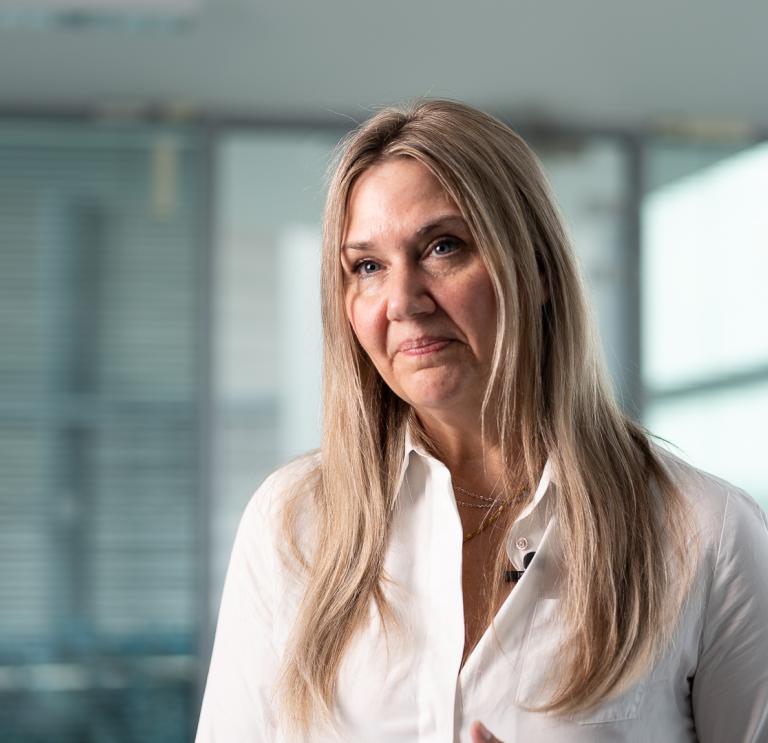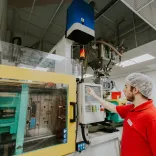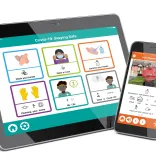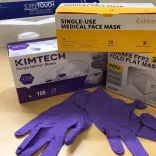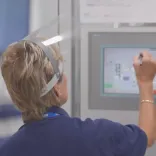Business backstory
Delays in diagnosing lung and heart conditions are among the biggest contributors to infant mortality.
Around a third of babies with a heart defect in the US and Europe are sent home without a diagnosis, and in the developing world that figure is much higher.
“Babies are literally dying because we are not identifying there’s a problem,” says Annamarie Saarinen, CEO and co-founder of Bloom Standard – a young medtech company, formed in Roseville, Minnesota and with a headquarters in Swansea.
“If we could do a simple, three-minute ultrasound scan for less than the cost of a newborn hearing screening, why wouldn’t you do it?”
This is where Bloom Standard comes in. Thanks to resources and support in Wales, the company is developing a low-cost, autonomous, hands-free ultrasound scanner, which can be used by almost anyone and almost anywhere.
“Routine ultrasound scanning doesn’t happen, and there are two reasons,” Saarinen explains. “Cost and training - the kit is expensive and generally only located in a few specialist hospitals, and you may need two years-plus of training to be able to use it, especially on babies and pediatric patients.
“So, routinely, all we have are stethoscopes and an examination. You look for signs and if there seems to be a problem the child has to go to one of these places for an appointment with a cardiologist or echo technician.
“Our device will help make rapid ultrasound screening available to babies wherever they are - and without waiting. Because delay can be the difference between life and death.”
Why Wales?
Bloom Standard is a part of Minnesota’s Medical Alley – the world’s leading health tech innovation cluster. With a base already established in Hong Kong, the company needed somewhere to launch into Europe, Africa, and the Middle East. Bloom is also part of Texas Medical Center Innovation, which has an established BioBridge with Swansea University
“We felt an English-speaking country would be easier for us, with no language barrier for recruitment” Saarinen says. “We visited a lot of places and talked to a lot of people. They could have worked, but in Wales we felt wanted."
How has the Welsh Government helped?
“When we met with people from Welsh Government, they were intuitive. They understood what we needed and they made it happen – they introduced us to the right people, and they did it quickly”.
Saarinen knows the importance and urgency of this work from her own experience. Her daughter, Eve, was born with a heart defect which was only discovered by chance. The paediatrician detected a murmur in newborn Eve’s heart. It’s a common symptom and rarely anything to cause concern. But, by coincidence, a scanner had been brought to the hospital that day to check another baby. They decided to test Eve, just for reassurance, and found a life-threatening congenital heart defect, which would require two operations.
“It was pretty rough. She had two heart surgeries as a baby. Without that imaging, we wouldn’t have known. She would have been sent home and wouldn’t have made it to the routine 10-day check.”
That life-changing experience now drives Saarinen to make such screening widely accessible. “Without her, I wouldn’t be doing what I’m doing now.”
Now Bloom Standard is planning to help save lives and improve the health outcomes of children like Eve wherever they are. NHS Wales and local health boards are helping with testing to meet regulatory requirements, and the device should be ready for production in 2024.
With a unit price below $5,000 – and even less for global health and low-resource settings – it will be affordable to frontline health facilities in markets around the world, thanks to the new base in Wales.
“We wanted a symbiotic relationship with health systems and academia, and we now have a location in the Institute of Life Science at Swansea University – ideally placed between the university and the hospital.
“Something about Swansea felt right, and the resources and collaboration has been there for us from day one. We had high expectations of Wales, and having been here a year, those expectations have been met – and more.
“I’ve had the privilege to work in some amazing innovation ecosystems - Medical Alley in Minneapolis, in the Asia-Pacific region and in Europe. But Wales is a really special place. I’ve really not seen anything like it”.
Learn more about Bloom Standard on the Bloom Standard website.
